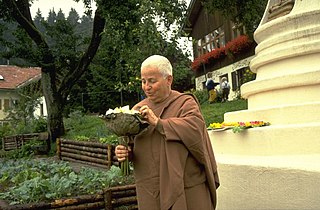A Quote by Rajneesh
Contentment is the door to god. If one is contented, one has already arrived. And the meaning of contentment is absolute acceptance as you are. Contentment means acceptance, discontentment means non-acceptance. A wants to become B - that is discontent. A is perfectly happy in being A, there is no desire to become B - that is contentment.
Related Quotes
As meditation goes deep you will feel less and less desires, more and more contentment with whatsoever you have. There will be less and less desire for that which you don't have, and more and more contentment with whatsoever you have. As meditation goes deeper, a very contented consciousness evolves. Ultimately there is no desire, only contentment.
Contentment with life is not a feeling, but it is a decision we must make. Contentment does not mean that we never want to see change or improvement, but it does mean we can be happy where we are and will do the best we can with what we have. It also means we will maintain an attitude that allows us to enjoy the gift of life.
We could become quite satisfied with ourselves because we are sitting in meditation and are endeavoring to practice the spiritual path. Such satisfaction with ourselves is not the same as contentment. Contentment is necessary, self-satisfaction is detrimental. To be content has to include knowing we are in the right place at the right time to facilitate our own growth. But to be self-satisfied means that we no longer realize the need for growth. All these aspects are important parts of our commitment and makes us into one whole being with a one-pointed direction.
There are, indeed, two forms of discontent: one laborious, the other indolent and complaining. We respect the man of laborious desire, but let us not suppose that his restlessness is peace, or his ambition meekness. It is because of the special connection of meekness with contentment that it is promised that the meek shall 'inherit the earth.' Neither covetous men, nor the grave, can inherit anything; they can but consume. Only contentment can possess.


































